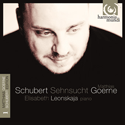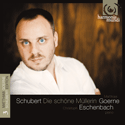22 Jun 2009
Schwanengesang at Wigmore Hall
A performance of sublime authority from Goerne and Eschenbach

A performance of sublime authority from Goerne and Eschenbach
After a searing Die Schöne Müllerin on Monday and a definitive Winterreise on Wednesday, Matthias Goerne and Christoph Eschenbach gave the Wigmore Hall audience yet another reason to feel almost unreasonably privileged on Saturday, with a Schwanengesang of an emotional intensity and technical prowess which it is hard to imagine being equalled.
This is a melancholy, tormented ‘cycle’ in the hands of these musicians, a far cry from the ‘charm’ which some see in the Rellstab settings, and the mood is set in the very first song, with a ‘Liebesbotschaft’ which speaks not of a prettily babbling brook carrying a message of love but of the same stream in which the Miller lad drowns and which is frozen over in ‘Auf dem Flusse.’ Indeed, the sense of a raging torrent beneath the surface pervades this interpretation, the message not one so much of tenderness as foreboding. That same sense of dread hovers over Goerne’s achingly poignant ‘Kriegers Ahnung,’ where the lines ‘Lag sie in meinem Arm’ and ‘Herzliebste — Gute Nacht!’ are delivered with touching sincerity.
‘Ständchen’ is always hard to hear anew, but Goerne and Eschenbach managed to make it sound fresh, the lines ‘In den Stillen Hain herneider, / Liebchen, komm’ zu mir!’ amazingly sung on one breath, the piano’s staccato notes underpinning the sense of disquiet. Even ‘Abschied,’ that grave of many a singer’s hopes of syllabic perfection (of course, Goerne got every one in place) was more of a farewell to life itself than just to a place and the people in it.
The Heine songs were tremendous — I have never heard so tormented an Atlas, or so heartbroken a rejected lover in ‘Ihr Bild,’ the legato line here sustained with quiet intensity and the sense of disbelief at ‘Dass ich dich verloren hab!’ utterly compelling. Similar technical perfection was heard in ‘Am Meer,’ the piano forceful rather than subdued, the voice melting from the solemn grandeur of the beginning to the bitterness of ‘Vergiftet’ at the end.
‘Der Doppelgänger’ was frightening: not only for the sheer fervour of the singing, but the elemental force which seemed to be behind the words, and the command with which they were sung. No one rises to that cruelly exposed high G as this singer does, and no one manages to make that howl of despair so absolutely eloquent, the ensuing ‘Du, Doppelgänger’ phrased with ringing authority. A magisterial performance, followed by one of those silences which speak louder than any applause. ‘Die Taubenpost’ was given as an encore, sung with tenderness and unforced candour, the crucial ‘Sie heisst — die Sehnsucht!’ not isolated but part of the same unaffectedly moving whole. I had thought that his performance with Brendel was as far as anyone could go with these songs, but I was wrong.
It’s always difficult to programme with this work, but here we had a brilliant solution in Schubert’s Piano Sonata D960. Eschenbach has been doing so much more conducting and accompanying in recent years that it’s easy to forget what a highly individual pianist he is — of course, his special quality is akin to Goerne’s in that his interpretations derive from the feeling that rhythm and not metre is the life-blood of music, and that the most sublime music of all is slow — very slow indeed, in the case of the sublime Andante here, taken more Molto adagio to my ears. Naturally I loved every audacious minute, but I can quite see that many would not. Schubert was almost certainly writing this sonata at the same time as he was working on the Schwanengesang settings, and it shares the same wonderful completeness and coherence whilst possessing something given perhaps only to ‘Die Taubenpost’ — a sense of serenity amidst sorrow, brought out wonderfully by Eschenbach’s playing.
Melanie Eskenazi
 |
 |
 |
| Sehnsucht | An mein Herz | Die schöne Müllerin |